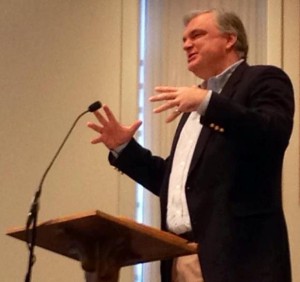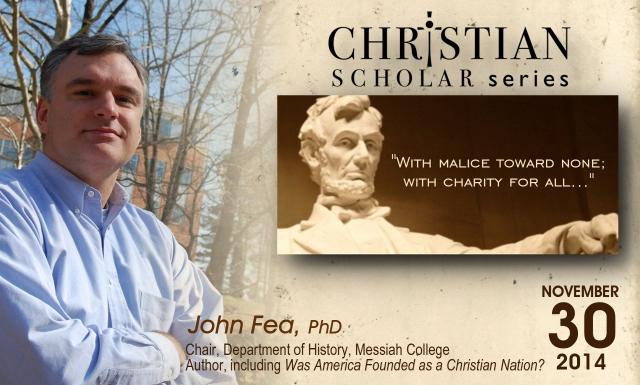Fellow-Countrymen . . . With malice toward none, with charity for all, with firmness in the right as God gives us to see the right, let us strive on to finish the work we are in, to bind up the nation’s wounds, to care for him who shall have borne the battle and for his widow and his orphan, to do all which may achieve and cherish a just and lasting peace among ourselves and with all nations. – Abraham Lincoln, Second Inaugural Address (March, 4, 1865).
On Sunday, November 30, John Fea (Chair, Dept of History, Messiah College) presented on . . .
- Abraham Lincoln’s use of the Sermon on the Mount in his Second Inaugural Address (March, 4, 1865).
- his engaging (and provocatively titled/covered) book Was America Founded as a Christian Nation? (Westminster/John Knox Press, 2011). Teaser quotes:
- “First, the past can inspire us. Second, the familiarity of the past helps us to see our common humanity with others who have lived before us. Third, the past gives us a better understanding of our civic identity.”
- “One of my goals in writing Was America Founded as a Christian Nation? is to get Christians to see the danger of cherry-picking from the past as a means of promoting a political or cultural agenda in the present.”
- “The past is the past—a record of events that occurred in bygone eras. But history is a discipline—the art of reconstructing the past.”
- “The writings of these constitutional skeptics present an interesting dilemma for those today who want to argue that the Constitution was a Christian document. In the eighteenth century it was those who opposed the Constitution who made the strongest arguments in favor of the United States being a Christian nation.”
- “When ministers, politicians, and writers during these years described the United States as a “Christian nation,” they were usually referring to the beliefs and character of the majority of its citizens.”
- “If there was one universal idea that all the founders believed about the relationship between religion and the new nation, it was that religion was necessary in order to sustain an ordered and virtuous republic.” — For more teasers visit Most Highlighted Passages in the Kindle Edition of “Was American Founded as a Christian Nation?” (5/24/2013).
 You’re probably not surprised that I most appreciated John’s honest engagement with our nation’s messy religious history — in this particular instance America’s founding and the conflict in/surrounding the the Civil War (topic of a future post) — at such a time as this through his gifts as a historian seeking to offer his vocation to Christ alone. In another context he has stated regarding the value of history:
You’re probably not surprised that I most appreciated John’s honest engagement with our nation’s messy religious history — in this particular instance America’s founding and the conflict in/surrounding the the Civil War (topic of a future post) — at such a time as this through his gifts as a historian seeking to offer his vocation to Christ alone. In another context he has stated regarding the value of history:
History teaches us that we are part of something larger than ourselves—a community made up of all kinds of people with all kinds of beliefs. If forces us to see the world through the eyes of others and empathize with their joys and struggles. History can decenter us by demanding that we understand life from another person’s perspective. This is the kind of history that has the power to strengthen our democracy, bring restoration to the brokenness of everyday life, and strengthen the civic bonds that hold our republic together. — Amen! For the larger context of this quote and its relationship to material addressed in Was America Founded as a Christian Nation? dig into American Religion Seminar at Columbia University (The Way of Improvement Leads Home, 2/12/2014).
As you may remember, the Christian Scholars Series is a budding partnership with the local congregation I attend.If you are interested in having a conversation with the Emerging Scholars Network regarding a similar Christian Scholar special event and/or speaker series at the local congregation of which you are a member (possibly with additional engagements on campus, at a local library, with donors over breakfast/coffee, in connection with the youth/college/young adult ministry, etc), please contact us. Yes, we have posted some of John’s material on the ESN FB Wall/Twitter, but stay tuned to the ESN blog for more from a scholar who thinks and writes “about American culture broadly defined, the intersection between ideas and everyday life in American history, the relationship between ‘cosmopolitanism’ and ‘place,’ the history of the early mid-Atlantic and New Jersey, and the connections between religion, politics and American culture.” In meantime, be sure to check out his blog (The Way of Improvement Leads Home: Reflections at the Intersection of American History, Religion, Politics, and Academic Life) AND recommend to us other scholars with whom we should be connecting.
Tom enjoys daily conversations regarding living out the Biblical Story with his wife Theresa and their four girls, around the block, at Elizabethtown Brethren in Christ Church (where he teaches adult electives and co-leads a small group), among healthcare professionals as the Northeast Regional Director for the Christian Medical & Dental Associations (CMDA), and in higher ed as a volunteer with the Emerging Scholars Network (ESN). For a number of years, the Christian Medical Society / CMDA at Penn State College of Medicine was the hub of his ministry with CMDA. Note: Tom served with InterVarsity Christian Fellowship / USA for 20+ years, including 6+ years as the Associate Director of ESN. He has written for the ESN blog from its launch in August 2008. He has studied Biology (B.S.), Higher Education (M.A.), Spiritual Direction (Certificate), Spiritual Formation (M.A.R.), Ministry to Emerging Generations (D.Min.). To God be the glory!


Leave a Reply